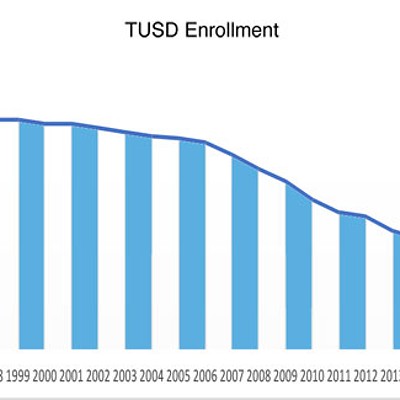Friday, March 5, 2010
Sierra Club Update: "There is Little Motivation by Legislators to Stop Most of the Ridiculous, Unconstitutional And … Generally Bad Legislation"
Here's the latest dispatch from the Arizona Legislature, courtesy of Sierra Club lobbyist Sandy Bahr:
Q: How many economists does it take to screw in a light bulb?
A: None. If the light bulb really needed changing, market forces would have already caused it to happen.
March 5, 2010
Hi everyone! Apparently, there is little motivation by legislators to stop most of the ridiculous, unconstitutional, and certainly not the generally bad legislation. This week, the House passed HB2337 Arizona manufactured incandescent light bulbs; regulation (Antenori, Biggs, Gowan, et al) 33-27. It says that incandescent light bulbs that are manufactured and sold in Arizona are not subject to federal law. This is an anti-energy efficiency bill that is probably unconstitutional and is reminiscent of the bill passed by the legislature that made it okay to manufacture and chlorofluorocarbons despite federal law and international treaties. Federal law requires that more efficient light bulbs be manufactured over time. The bill is intended to promote a lawsuit, but I do not believe there is a constitutional right to inefficient light bulbs.
They also passed HB2290 waste tires in abandoned mines (Jones, Kavanagh, Mason, et al) 34-26. This bill allows waste tires to be used to fill abandoned mines. It is a recycled bad idea from last year andthe year before. After discussions in 2008, a compromise was reached to allow the filling of these abandoned mines with inert waste materials, not something that puts at risk our air and water. Even the Rubber Manufacturers Association has come out against it as a truly bad idea. We will see what happens when the rubber meets the road in the Senate (sorry, I couldn’t resist).
The Senate passed a couple of dirty air bills, including SB1193 agricultural best management practices; enforcement (S. Pierce). It states that the Arizona Department of Environmental Quality has exclusive jurisdiction over the enforcement of dust control regulations for agricultural activities in PM-10 (particulates) nonattainment areas and totally pre-empts local government. There are several problems with this. First of all, it removes enforcement authority for these limited dust control best management practices from the counties. Counties usually have more inspectors and are better positioned to address these. Next, these dust control provisions need to be enforceable under the Clean Air Act which includes the federal government and citizens. This bill sprung out of an enforcement action by Maricopa County, something they should be doing to protect the public health. The agricultural interests seem to want to do nothing and have no enforcement and will likely get it, if this bill passes.
Please keep the calls coming to Representative John Kavanagh on HCR2040 sustainable state parks fund (Jones, Brown, Ch. Campbell, et al). He is refusing to hear it in the House Appropriations Committee. Ask him to please allow the bill to be heard or released from his committee. The bill refers to the ballot a measure to allow free day use of all of our State Parks for a fee on every vehicle registration. The funds would be administered by the State Parks Board to operate and maintain parks. With this $12 fee ($3 of which will go to the Arizona Department of Transportation), Parks can generate approximately $39 million per year. This would provide the necessary dollars for operation and maintenance of our State Parks System including the natural areas, historic parks, and lakes.
Please send a polite message to Representative Kavanagh via email at jkavanagh@azleg.gov or call (602) 926- 926-5170. If you are outside the Phoenix area, you can call 1-800-352-8404 and ask to be connected to his office.
This week, also please contact your Senator and ask him or her to please oppose SB1200!
It is unnecessary, divisive, and will limit the involvement of the public in wildlife management issues.
SB1200 state land department; procedural corrections (Nelson) has a strike everything amendment on the game and fish commission; board. The striker sets up the Arizona Game and Fish Commission appointment recommendation board, which is made up of narrowly defined hunting organizations, one member of the public, and one rancher. The purpose of this board is to interview Game and Fish Commission candidates and make 2-5 recommendations to the Governor — she has to pick a commissioner from among those recommendations.
This bill is being pushed by a group that represents a small percentage of Arizona’s hunters and anglers and that does not represent the broader interests of the public or of wildlife. They are trying to ram this bill through in order to ensure complete control of the Game and Fish Commission and to block the appointment of anyone that does not pass their litmus test. Contrary to their belief, Game and Fish is not a trade association. It is a public agency and must be accountable to public at large, not just to a couple of groups. The wildlife managed by Game and Fish does not belong to one group or even several groups; it is a public trust and to be managed as such.
To email your legislators or find their direct phone numbers, click on Legislators or paste http://www.azleg.gov/MemberRoster.asp into your browser. If you're outside the Phoenix area, you can call your legislators’ offices toll free at 1-800-352-8404. In the Phoenix area call (602) 926-3559 (Senate) or (602) 926-4221 (House) and ask them to connect you with your legislators.
There are again no committee hearings this week as Legislators are supposed to work on the budget.
Here is a quick update on a few more bills:
HB2060 public conservation monies; transfer (Nichols) was put on the House Third Read Calendar, but then was skipped over. The bill diverts $40 million from the Public Conservation Account in the Land Conservation Fund established by the voters in 1998 when they approved the Growing Smarter Act referred to the ballot by the Arizona Legislature. The dollars are diverted to state parks and to historical societies. While these are worthy causes, they are not the causes for which these dollars were approved by Arizona voters. This bill is unconstitutional, just as it was last year, as it in no way furthers the purposes of the “Growing Smarter” measure that went before the voters in 1998 and there is no guarantee that any of these dollars will ever be restored. None of you can bind the next Legislature on budget issues. This promise is similar to “the check’s in the mail.” OPPOSE.
HB2146 trust lands; loss of lease (Konopnicki) passed out of the House Committee of the Whole. It creates another and significant obstacle to any competition relative to State Trust Land grazing leases. It requires that anyone, with the exception of the existing lessee, who wants to apply for a grazing lease get a list and an appraisal of all nonremovable “improvements” on the lands. This includes fences, water tanks, and such. Applicants must already pay for the improvements if they are awarded the lease, but this requires significant expenditure of dollars before even applying. This bill is clearly intended to bar any competition for grazing leases and continue to keep them in the hands of existing lessees. OPPOSE.
HB2260 regulatory rule making (Tobin) passed out of the House 41-18-1. This bill is another step in Arizona’s race to the bottom. It helps ensure the weakest and least protective permits will be issued relative to air and water pollution. This bill makes the default for a permit, a general permit, unless certain conditions apply. One of those conditions is not that it be more protective of the environment or public health, however. General permits for facilities do not include a public process and require limited, and most often, no public notice, plus are generally much less protective of resources. Already, we are seeing these permits be misused by the Arizona Department of Environmental Quality; just last year it issued general permits relating to groundwater protection for two proposed uranium mines. Uranium mines should not be permitted under general permits.
The bill also prohibits the Governor’s Regulatory Revue Council from approving a rule unless clear and convincing evidence proves the benefits outweigh the costs. No rules can be stricter than federal law. Again, the Legislature apparently wants the weakest standards possible, so the next generation can pay all the costs for today’s actions, including pollution of air and water. OPPOSE.
HB2289 water recharge; direct use (Pratt, McGuire: Barnes) passed out of the House 39-20-1 and its companion in the Senate — SB1241 — passed 22-7-1. It allows the Director of the Department of Water Resources to exclude very specific groundwater when calculating a Resolution Copper Company’s long-term storage credit. This is being added to the statutes specifically for Resolution Copper (aka Rio Tinto, a U.K based mining giant). The company is banking “excess” Central Arizona Project water for future mining operations and in doing so accrues long-term credits. Resolution Copper is also dewatering the Magma mine. The groundwater they are pumping should be charged against the credits they get for the CAP water, but they are attempting to create this loophole in the law, so that the groundwater pumping is not charged against their credits. The law requires it to be an offset if the groundwater can be used directly — in this case for the New Magma Irrigation and Drainage District. This bill will allow them to receive those credits and have no offsets on the groundwater that can indeed be directly used. OPPOSE.
HB2451 line extensions; utility infrastructure, charges (Antenori; Crump, Gowan, et al) was held in the House Rules Committee, because the Rules attorney said it would need a constitutional amendment to be constitutional. That is a nicer way of saying “This bill is unconstitutional!” This bill prohibits a public service corporation from charging a customer for the first 1000 feet of a line to extend electric service. It infringes on the constitutional rate-making authority of the Arizona Corporation Commission and also shifts one of the costs of sprawl development from the developers back to the ratepayers. The reason the Arizona Corporation Commission discontinued this policy of free extensions was the Commission determined it was unfair to burden ratepayers with these costs. Growth and development should pay for itself. OPPOSE.
HB2617 mining amendments; water; permits; rules (Jones, Gowan, Mason et al) did not move forward, but there was a stakeholder meeting. I do not hold out much hope that this bill will be improved much, if at all. This bill will result in less protection for Arizona’s waters. It gives mining interests even more exemptions and sacrifices protection of our water for their profits, which is totally unnecessary. Arizona does not even come close to “over-regulating” mines. HB2617 is short-sighted as it restricts rule adoption in a way that limits any rule that exceeds or conflicts with any relevant or applicable federal requirement, standard or permit condition, unless specifically authorized by law. Why does the Arizona Legislature have so little regard for the resources of this state that it would not want to allow for the strongest protections possible at the state and local level? What if local conditions warranted stronger protections? And why does the legislature want to cede the regulation to the federal government in this area. There is a lot more in here including interbasin transfers of water, which mines can already do — this opens up that exemption further, which is the last thing we need. OPPOSE.
HB2676 energy park authority (Nichols, Meza, Pancrazi, et al) was retained on the Committee of the Whole calendar in the House. It establishes a new unaccountable bureaucracy to fund so-called energy parks for building energy generation and to establish a statewide energy plan. The bill establishes the Energy Park Authority, which is governed by a board of directors that consists of a mix of government and private sector appointees. The Energy Park Authority will have taxing authority. Under this legislation, Energy Parks and ALL new and existing electricity generation property will be taken off the tax rolls and then valued at 20% of its cost. It is the mother of all tax reductions for the utilities. One of the troubling aspects of HB2676 is it is supposed to expedite the generation and transmission siting and construction. We already have a pretty quick siting process — nearly everything is approved by Line Siting and the ACC within six months.
OPPOSE.
HCR2008 constitutional rights; hunting and fishing (JP Weiers, Gowan, Crump, et al) went through Rules and Caucus, but has not come to the House Floor yet. It refers to the ballot a constitutional amendment that, if passed, will have a significant and negative impact on wildlife and wildlife management in Arizona. The measure effectively limits the authority of the Arizona Game and Fish Commission to regulate and manage wildlife consistent with its duties and the rights of citizens to enact legislation by initiative. Furthermore, it makes science take a back seat on decisions relative to bag limits, whether or not there is hunting in a particular area, or whether hunting must be suspended in order to facilitate species recovery. OPPOSE.
If you are not sure who your legislators are, please go to http://azredistricting.org/mapping/default2.asp?tname=Interim.2009.Legislative.Map&service=ircmaps&Layer4=on&Layer1=on&action=zoomin&ActiveLayer=16 or call the House or Senate information desks. For more information on bills we are tracking, go to http://arizona.sierraclub.org/political_action/tracker/
Tags: Arizona Legislature , Sierra Club


















